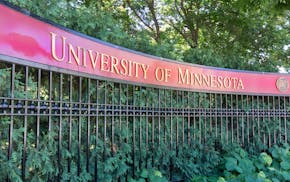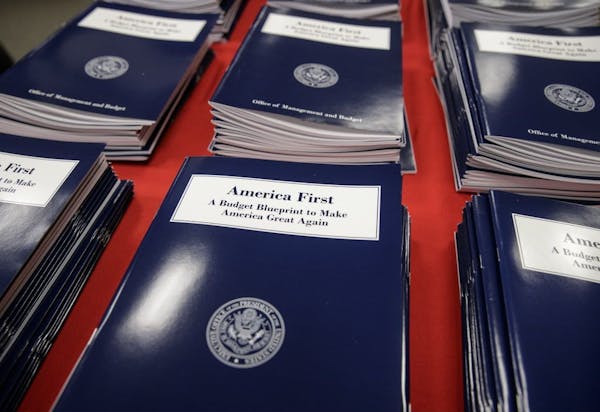WASHINGTON – It was a grim time to celebrate Great Lakes Day at the Mayflower Hotel in the nation's capital.
President Donald Trump had just announced a budget that would end a massive federal effort to restore the Great Lakes from Minnesota to New York, as part of a 31 percent cut to the Environmental Protection Agency (EPA).
John Linc Stine joined congressional and environmental leaders over breakfast to talk up the $300 million program.
"There was a lot of pushback against the president's opening shot," said Stine, commissioner of the Minnesota Pollution Control Agency.
Minnesota's leaders scrambled on Thursday to make sense of the president's $1.15 trillion spending plan and its wide-ranging effects on citizens from Lake Superior to the Twin Cities.
Under the plan, Minnesota and other states would lose millions in funding for the arts, affordable housing, education and medical research to offset more military spending.
That military boost could benefit Minnesota companies that have done work before for the Defense Department and companies looking to sign federal contracts, a defense lobbyist said.
Most of the Pentagon's needs range from office supplies to equipment that protects soldiers in the field, not bombs or bullets, said Chip Laingen, executive director of the Defense Alliance, a federally funded group that advocates for defense companies in the Upper Midwest.
Among the areas that should benefit, Laingen said, are renewable fuels, advanced batteries, solar power, advanced cyber security systems, nanotechnology and advanced materials. He said Minnesota is especially well-positioned to help in the area of biofuels, in part because of research done at the University of Minnesota-Duluth with the U.S. Department of Energy.
"We are trying to make sure Minnesota gets noticed by [Defense] in the area of advanced biofuels," he said.
Help for the poor
But most officials Thursday spoke of the negative impact Trump's budget would have on their programs. It would cut federal funding that helped 339,900 poor Minnesotans pay their heating bills last year, most of them seniors, children and disabled people.
Local government officials lamented the proposed elimination of community block grants that help fund housing and economic development programs. St. Paul officials said they rely on the grants to redevelop foreclosed and tax-forfeited homes, offer affordable housing opportunities and give job training to students of color.
The budget would kill the AmeriCorps community service program, for which the Twin Cities metro area produces more volunteers per capita than any other in the nation. Minnesota volunteers reached 30,000 children in the reading program alone.
"Why would anyone want to cut off our ability to build a strong future workforce while supporting our youth and their families?" said St. Paul Mayor Chris Coleman, in a statement.
Transit cuts
The Trump budget would cut federal funding on dozens of transit projects across the country. It would end federal support for Amtrak's long-distance train service, including the Empire Builder which crosses Minnesota, and endanger the proposed Southwest and Bottineau light-rail lines expected to run in 2021 and the Orange Line bus-rapid transit line slated for 2020.
The administration said projects that won a full funding grant agreement from the Federal Transit Administration (FTA) before Oct. 1 will not be chopped. Southwest is expected to submit its application to the FTA in July, with approval anticipated by December, but it's unclear if the project will be approved before the start of the fiscal year. To date, $159 million has been spent on the project.
The Metropolitan Council was expected to apply next year for a $753 million federal grant for the $1.5 billion Bottineau project, and a $74 million federal grant in early 2018 for the $150.7 million Orange Line.
Adam Duininck, chairman of the Metropolitan Council, said in a statement that he was "disappointed that the president starts this conversation by abandoning his commitment to critical infrastructure investment and job creation." He noted that 7,500 jobs would come with the Southwest project, and the line would link to 64,000 jobs.
The budget would eliminate the Essential Air Service program, which Congress enacted in the late 1970s to ensure small airports maintained air service after deregulation. Without the subsidies, which range from $1 million to $1.5 million per airport, "airlines might determine it is not profitable to serve those communities and decide to discontinue service," said Patrick Hogan, spokesman for the Metropolitan Airports Commission.
U research
Last year, the University of Minnesota received nearly $466 million in federal research funds, much of it from agencies that would face steep cuts under the Trump budget, according to U spokesman Dan Gilchrist. The single largest chunk — $257 million — was funding for medical research from the National Institutes of Health, slated to lose 19 percent of its budget under the Trump proposal.
"The size of the cuts, should they go through, would be fairly unprecedented," he said.
Dr. Jerrold Vitek, who studies Parkinson's disease at the U, said the proposed cuts would slow efforts to find new and better treatments for patients. "That is a disastrous thing to do," said Vitek, whose team receives more than $16 million in federal grants.
The U receives tens of millions from other federal agencies, such as the Energy and State departments, the Agency for International Development and the National Endowment for the Humanities.
Cultural programs
Public TV and radio stations would take a financial hit if the administration succeeds in eliminating the Corporation for Public Broadcasting. For smaller operations, the outcome could be more dire.
"If it goes away, we go away," said Margaret Rousu, general manager for KKWE-FM, which serves the White Earth Indian Reservation and the surrounding region in northwestern Minnesota. She estimated that two-thirds of her budget comes from the CPB.
At Pioneer Public Television, based in Appleton, Minn., federal funding accounts for roughly 30 percent of the budget. "That money is critical and not replaceable," said general manager Les Heen.
Cultural groups voiced alarm about Trump's plan to eliminate the National Endowment for the Arts (NEA), which gives $5 million a year to arts groups in Minnesota. Across the state, arts groups and artists decried news of possible cuts, saying that federal funding helps them premiere new works, attract private money and fund artists' projects.
"We're serving people who live in rural areas, in economically disadvantaged communities. So we're serving a broad swath of folks," said David Fraher, executive director of Arts Midwest, the regional arts organization that regrants NEA funds.
The proposed budget looks to funnel an additional $1.4 billion to public and private school choice programs, continue support for students with special needs and help funds go with students to the public schools they choose. That triggered boos from Denise Specht, president of the teachers' union Education Minnesota, who criticized the budget's drive "to send children to unaccountable and exclusive private schools." But it won cheers for its aid to school choice from Kim Crockett of the conservative Center of the American Experiment.
"This empowers parents, especially low-income parents, to send their kids to a better school," Crockett said in an e-mail.
Staff writers Neal Justin, Janet Moore, Jeff Meitrodt, Jenna Ross, Maura Lerner, Erin Adler and Beena Raghavendran contributed to this report.
Maya Rao • 612-673-4210

Teen suspect in Nudieland mass shooting arrested on murder, assault charges
'Human error' behind Robbinsdale shelter-in-place alert that was mistakenly sent countywide

Going to Wolves or Twins tonight? How to get there (and maybe avoid traffic).
Focusing on bringing football film into frame

